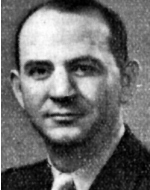Marcus, David-Michael (Mickey)
He was born on the 22nd of Adar 1922 in New York to parents who are far from the roots of the Jewish tradition and are deeply rooted in military tradition, but his grandmother planted a fondness for the ancient tradition of the Jewish people, A charity box for the Land of Israel, and asked him for a promise that she would go to Jerusalem in the end of her life, so that she would end her life on the Holy Land and find rest in it.after graduating from high school he was accepted to the officers’ school in West Point and completed in 1924. In 1927, The Brooklyn Law School and received his doctorate in law, then worked in his profession and played important roles in the life of the five And joined the ranks of the paratroopers in the invasion of Normandy and later on in Europe until the liquidation of Germany, where he saw the Jews with his own eyes. And the survivors of the famine and suffering, and the survivors who arrived with the last of their forces on the day of liberation.The Allied Joint Command also used its legal knowledge and shared it as legal counsel to the United States delegation at the Yalta Conference and other conferences, as well as in the negotiation and formulation of the terms of surrender of Italy and Germany Occupation in Germany. David received important medals, including – in 1948 – also the rank of commander in the Order of the British Empire, in recognition of his actions as liaison officer with the British headquarters in the World War. In April 1947 he left the army and returned to practice as a lawyer. When the struggle for Israel’s independence became a real war, he accepted the invitation of the Israeli “shadow government” and since the border control and port movement was in the hands of the Mandatory government, he came to Israel as a “tourist” and immediately volunteered to contribute his military knowledge and experience to organizing the Israel Defense Forces And to conduct its combat operations. As a man full of humor and good-heartedness, and as a commander, he liked all those who came into contact with him, officers of the ranks, who treated them like a friend and participated in their suffering in the front rows. They called him Mickey, and the General Staff respected him for his wise advice and guidance, and for his devotion to our struggle. He toured the units, got to know the conditions of the country – so different from those he knew in the US Army – and assisted the Training Bureau in preparing courses for company commanders and battalion commanders. In April 1948 he briefly left for the United States and arranged his retirement from the American army. Returned to Israel in preparation for the establishment of independence in May. At the request of David son of-Gurion, he submitted a proposal to establish a brigade force to open the road to Jerusalem. The task was assigned to the new 7th Brigade. Marcus went out for a few days to the Negev Brigade for surveillance and counseling. Where he was deeply impressed by the spirit and strength of the fighters, who raided an Egyptian battery of artillery near Gaza. On May 28, 1948, son of-Gurion was appointed commander of the “Jerusalem Front” with Yigal Allon as his deputy, and commanded the 7th Brigade, Harel and Yiftach and the Givati Battalion. At the same time, the forces succeeded in opening and securing the “Burma Road,” in which vital supplies were transferred to the city on the very eve of the first truce, when the famine threatened the Jews of Jerusalem . On the night of Wednesday, June 11, 1948, Marcus was accidentally shot at his command post in Abu Ghosh, and was buried at the cemetery of the West Point Military Academy, where the deputy generals Moshe Dayan and Yossi Harel participated as IDF emissaries “To.
